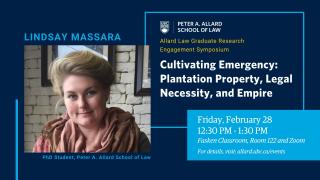Event Description
Lindsay’s work examines the connections between concepts and the histories of property, legal necessity, emergency, and empire. Through an emergency lens, I investigate how spaces such as plantations vividly embody the logic of colonial power through the language of legal necessity and the property framework. Expropriation, dispossession, confiscation, bondage, and slavery are familiar forms of property-taking carried out under the legal justification of necessity as part of an ongoing colonial emergency. This talk centres on two colonial plantation case studies to illustrate how the territorial landscape of empire was (re)shaped by concepts of property, informed by evolving definitions of legal necessity that underpin declarations of emergency. Here, I argue that the expansion of penal contract tea plantations across Assam and the destruction of the Irish communal land-holding structure known as clachan should be interpreted as a legal history of a common law emergency. This approach connects seemingly disparate and contingent fragments of history through constellations of legal knowledge, practice, language, and power—constellations that continue to linger over common law like diacritical hauntings.
Lindsay is a PhD student in law at UBC. Her research focuses on legal history, emergencies, and property. She previously taught international law and human rights courses at the University of Oregon School of Law, where she completed her JD and MA. Before that, Lindsay was the senior law clerk for Oregon Supreme Court Justice Bronson James.
Cultivating Emergency Plantation Property, Legal Necessity, and Empire (PDF)
Speaker
- Graduate Programs
- Research
- General Public
- All Students
- Alumni
- Faculty
- Graduate Students
- JD
- Staff
- Research Talks

